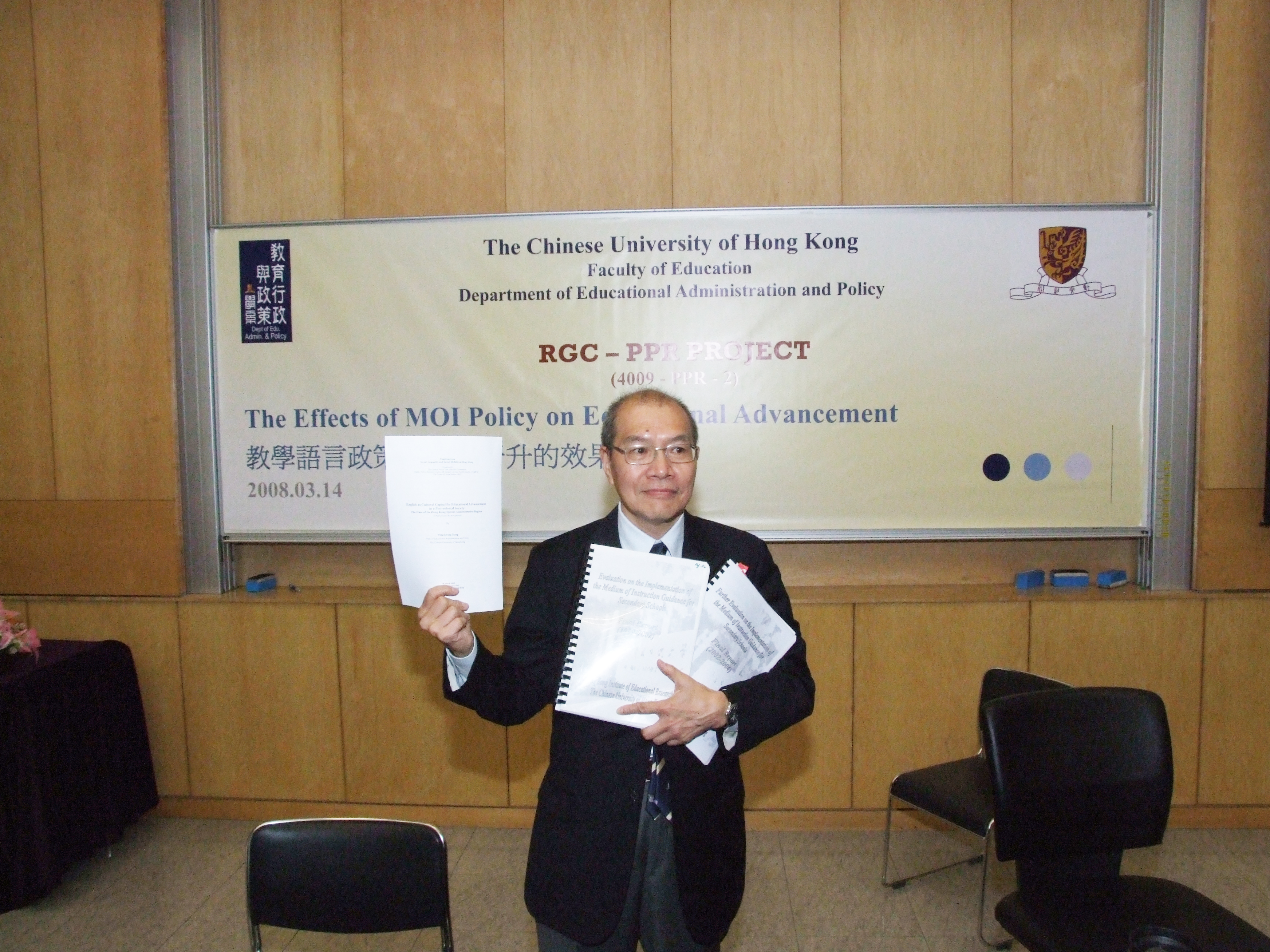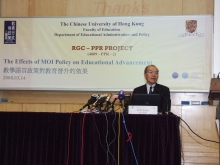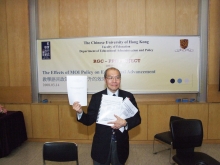News Centre
CUHK Faculty of Education Releases Findings of the Study:“The Effect of Medium-of-Instruction Policy on Education Advancement”
“The effect of Medium-of-Instruction (MOI) policy on education advancement in HKSAR society” is one of the studies of the Public Policy Research project (4009-PPR-2) funded by the Research Grants Council of the University Grants Committee. Conducted by Prof. Tsang Wing-kwong, professor at the Department of Educational Administration and Policy, the study is the third phase of a seven-year longitudinal study. It traced the educational progression of two cohorts of students who commenced their secondary education respectively in the school years 1998/99 (the 98 cohort) and 1999/2000 (the 99 cohort), the first two school years after the implementation of the “MOI Guidance for Secondary Schools”. The study was aimed at investigating the chances of success of these two cohorts of students in various thresholds as they moved from secondary to university education. These thresholds include the HKCEE, HKALE, JUPAS, and admission to the UGC-funded universities.
Methodology
One hundred local secondary schools were sampled by stratified random sampling. All the Form-1 students admitted to these schools in the school years 1998/99 and 1999/2000 were subjects of the study. Each of the two cohorts had about 15,000 students sitting for the 2002 and 2003 HKCEEs and about 5,000 students participating in the subsequent 2004 and 2005 HKALEs.
The study has analysed the chances of success (success rates) of the two cohorts of students in passing the following five thresholds along their advancement from secondary to university education in HK.
- Obtaining 5 passes (E grades) or above in the HKCEE, including Chinese and English languages (Syllabus A or B);
- Obtaining 8 grade-points or more in the HKCEE, including E grades in both Chinese and English languages (Syllabus A or B);
- Obtaining 14 grade-points or more in the HKCEE, including E grades in both Chinese and English languages (Syllabus A or B);
- Meeting the minimum entry requirements of seven of the eight local universities participating in the Joint University Programmes Admissions System (JUPAS), i.e. obtaining passes in 2 AL or 1 AL and 2AS subjects in HKALE, and E grades in Chinese Language and Culture and Use of English;
- Meeting the minimum entry requirements of the University of Hong Kong as specified in JUPAS, i.e. same as those in (4.) except obtaining a D grade or above in UE.
Prior to analysing the effects of different MOI streams on students’ ‘success rates’ in passing these thresholds, the effects of five background variables of the sampled students and their schools have been statistically controlled. These background variables were:
- Individual students’ Academic Achievement Index (AAI), i.e., the overall achievement score designated to each primary-school leaver by the EMB for the Secondary School Places Allocation system;
- Socio-economic Status (SES) of students’ families
- Individual students’ gender
- School-mean AAI of the respective cohort
- School-mean SES of the respective cohort
With these five background indicators established, students with equivalent backgrounds were identified. And the effects of MOI streaming policy on the educational attainments of students with equivalent backgrounds were studied.
Research Findings
The study found that CMI students’ ‘success rates’ in passing the five abovementioned thresholds were significantly lower than that of their counterparts in the EMI stream.
The study also showed that the further streaming of CMI students into English or Chinese-concentrated streams also produced significant negative effects on CMI students’ chances of success in educational attainments in the HKCEE and HKALE. More specifically, CMI students were streamed in senior forms and in the HKCEE into two groups, namely, CMI-E and CMI-C. The former are CMI students who switched to EMI in Form 4 and 5 and subsequently entered for English-version papers in most of the content-subjects in the HKCEE and took syllabus B in the English language exam. The latter are CMI students who entered for Chinese-version papers in most of the content-subjects and most of them took Syllabus A in English language exam in the HKCEE. The study revealed that the chances of success for these two groups in passing over the five thresholds were both lower than that of EMI students, with CMI-C having the lowest ‘success rate’.
When investigating the contributing factors to the unfavourable situations of CMI students in their progression from secondary to university education, this study found that one of the major obstacles confronting CMI students is their lower achievements in the subject of English language as compared to EMI students, especially those in the subject of UE in the HKALE.
Finally, by relating the findings of this study with those of the first two phases of the longitudinal research (Note: The executive summary of the first two phases of the seven-year longitudinal study can be downloaded from the EDB website), we can get a fuller picture of the effects of MOI policy on the learning process of HK students.



